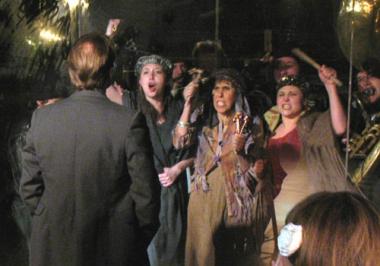Milosevic at the Hague is half whimsical biography, half courtroom drama (complete with a table-turning climax) and half dreamplay that weaves together real and imagined events and personages. And no, that's not faulty arithmetic. This show really does add up to more than the sum of its parts.
The production, a world premiere, is the first play to be produced at Window, the aptly named space on Northampton's Main Street that is the A.P.E. arts center's new home. And it's the second show by the usually youth-centered Serious Play Theatre Ensemble to feature a cast composed mainly of older adults. Both the strong casting choices and imaginative use of the non-theater space are inspired. It's the most complex, compelling and aesthetically mature work in Serious Play's 15-year history.
The title character is Slobodan Milosevic, the Serbian strongman who was tried for war crimes and genocide by the International Criminal Tribunal at the Hague—a trial that was cut short by his sudden death. Charged with ethnic cleansing in the breakaway regions of the Yugoslav Federation, including Bosnia and Kosovo, Milosevic conducted his own defense, challenging the court's legitimacy and turning the war-crimes accusations back on the NATO air bombardment that caused massive civilian casualties in Serbia and Kosovo.
Milan Dragicevich's sprawling script draws on his Serbian ancestry to add cultural context to the political drama. The text is by turns playful, eloquent and fierce, if sometimes a bit long-winded. Jumping back and forth in time, blending facts with dreams, the playwright brings to life a vivid array of figures drawn from headlines, history and legend.
They're not all human. Three vilas—wood nymphs of Balkan folklore—dance in and out of the action and sing snatches of Serbian folk songs in the ravishingly dissonant harmonies of Balkan women's music. Gracefully embodied by Alyssa Breguet, Peggy Gillespie and Adrienne Paquin, they also serve the same function as Macbeth's three witches, fueling Milosevic's ambition with prophesies of power.
Kermit Dunkelberg is kaleidoscopic as the defiant, charismatic Milosevic. From his opening scene, an ironic monologue addressed to the video surveillance camera in his jail cell, through flashbacks to the reticent young man who discovers his gift for crowd-stirring oratory, to the snarling, unrepentant prisoner in the dock, Dunkelberg gives us a man who is at once larger than life and agonizingly human.
His nemesis is Carla Del Ponte, Chief Prosecutor at the Hague. In Marina Goldman's eye-popping performance, she's equal parts sex and venom, a cobra who transfixes her victims before devouring them. Her two assistants, played by Eric Rehm and Richard Vaden, are young American attorneys, lapdog apprentices whom she tutors in prosecutorial strategy in the form of an icily seductive tango lesson.
Barbara McEwen plays Milosevic's wife, Mira Markovic, who is just as hard and ambitious as Del Ponte (costumer Elizabeth Smolin dressed both of them in jet black and blood red). A staunch party-line socialist, she pushes Milosevic into politics. McEwen gives her a steely gaze and a ramrod back, until she crumbles, crazy with fear as the war closes in (more shades of Macbeth).
Court Dorsey plays two thematically related American generals: Michael Short, who commanded the NATO bombing campaign, and William Tecumseh Sherman, the Civil War architect of "total war," who appears in Milosevic's dream to suggest the parallel between the brutal razing of Atlanta and the shock-and-awe tactics of modern warfare. Dorsey is mesmerizing as both these professional soldiers—cold, rational practitioners of calculated devastation.
Milosevic at the Hague has an offstage star, too. Guitar genius John Sheldon, sitting to one side behind a Fender and an array of effects pedals, provides not only a haunting musical underscore but sound effects including screaming fighter planes and bomb concussions, creating a soundscape that becomes virtually a character in the play. The self-styled "psychedelic Dixieland" ensemble Primate Fiasco adds another layer of music. Popping in and out as a Serbian gypsy band, they play a raucous blend of Balkan jazz that puts a giddy spin on the proceedings.
A couple of scenes in the courtroom question the nature of "war crimes." Are they, by definition, committed only by the losers in a conflict, while the victor/prosecutors' savage acts go unpunished? Is a machine-gun massacre a greater outrage than shredding children with cluster bombs dropped from the sky? Was the death of journalists in the bombing of Belgrade's Media Center a crime committed by NATO's aircraft or by Milosevic's government, which failed to warn them?
Between the epic adversaries in the tribunal's courtroom and the supernatural sprites in Serbia's fields and streams stand three ordinary humans: an old Kosovar Serb (Nick Sims) who fears the urge to independence by the province's ethnic-Albanian majority, and his young niece and nephew. The girl (Anna Ryan Dynarski) fancies herself a woman warrior in the mold of a legendary Serbian resistance fighter. The boy (Dan McNamara) wants to grow up to be a photojournalist—and ends up working in the Media Center.
The new A.P.E. space is a long, narrow storefront with an all-glass streetside wall—not the easiest place to stage a play. Sheryl Stoodley's long experience with Serious Play's environmental approach to physical theater serves her well here. With her co-director, Dragicevich, she has turned the room's limitations into assets.
The audience is seated in two long rows against the walls, facing each other across the playing space. We are, in effect, spectators in the courtroom, watching ourselves watch the proceedings. The floor-to-ceiling window to the street lets us also watch the passersby on the sidewalk, many of them pausing to look in. Without disrupting or distracting, this two-way mirror creates an interaction between the stage and the world, and adds one more layer to the play's multiple perceptions of reality and truth."
Milosevic at the Hague: through March 1, A.P.E. at Window, 126 Main St., Northampton, 866-811-4111 or www.theatermania.com.



